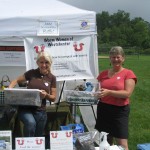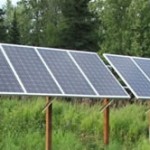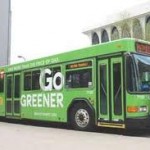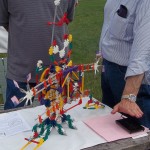Last weekend, I had a table at a nearby community event, a 4th of July celebration that prided itself on it’s commitment to sustainability.
As my fellow Transition Westchester members and I set up our tent, we knew we were in the right place at the right time. It was great to see other people who were on the same page as we were. The community had heeded the warnings about climate change and peak oil and had made the necessary changes to live a lower carbon life. Most people were pleasantly surprised to discover that transitioning to a more resilient life with less oil resulted in a life that was more abundant, fulfilling, equitable and socially connected.
Portable solar panels powered the stage where speakers spoke and musicians made music. No need to burn coal or use dangerous nuclear power to run the electricity at this event!
Instead of wasteful bottled water or poisonous soda, cool and clean filtered tap water was offered free of charge at locations throughout the fair. Local scout groups sold re-useable water bottles as fundraisers.
Portable composting toilets were utilized instead of the stinky blue ones. Most people at the event were already familiar with composting toilets and had them at home. They understood that our old system of toilets wasted huge amounts of perfectly good water. The shift had been made by a volunteer army of compost educators. Everyone was pleased because of the huge savings on their water bills.
Despite the big crowds, there was ample parking. This was most likely due to the fact that most people car pooled to the event. Because of peak oil, municipalities had elected to improve public transportation so now hybrid buses ran on expanded routes throughout the town. People were happy to use them and to keep their cars at home.
In addition to music, there was food. Because this was a zero waste event, most people brought their own plates and utensils. The scout troops sold some compostable utensils for those who forgot to pack their own. Just like getting into the habit of carrying re-useable bags instead of plastic, it takes some time to get used to remembering to bring your own.
Most of the food in the Taste of the Town event came from farms in the nearby Hudson Valley and from local community gardens. For just $10, you could eat all you want. The early summer provided chefs with zucchini in many different forms along with green salads galore. There was no unhealthy food because, quite frankly, junk doesn’t grow in gardens. No one missed the junk, there were berries galore and watermelon too. Who needs high sugar desserts when you’ve got fresh fruit?
Those leftover watermelon rinds and other food scraps were put into containers for compost. Needless to say, our worm composting systems were a big hit. Kids and parents alike loved to feed our composting worms and many families bought worm composting systems to bring home.
This is what green and sustainable looks like. It’s easy, delicious and very doable.
Unfortunately this is a fictional story.
The real 4th of July event was in June, how crazy is that? The fair was no where near as green or as sustainable as the event I described above. Here’s what really happened.
Traffic to the event was tied up in both directions because everyone traveled in their cars, mostly gas guzzling SUVs. The parking lot was over filled and people had to park on the side of the road and walk. No hybrid buses were available, in this part of suburbia, driving is mandatory and most people easily rack up hundreds of miles on their car in a week.
The event had some big sponsorship from a major soda company that has corporate offices in town. Soda and bottled water were the only options for sale. They patted themselves on the back for having scout troops over see the recycling. Crazy because recycling is the LAW, everyone should be doing it. Recycling is the last of the 3 R’s, reducing and re-using come before re-cycling.
There was a ten dollar Taste of the Town, but the local restaurants did not incorporate local food. Plastic papers and forks were plentiful and the garbage containers were overflowing at the end of the day. All of that waste was headed to the nearby incinerator soon to end up in our air.
There was a sustainability table at the fair. The town’s energy advisory panel was there giving away free compact fluorescent bulbs to help people save energy. There was no where in the town to return the used CFL bulbs and there was no outreach to educate the community about the fact that these energy saving bulbs contain mercury and should never be tossed in the garbage.
The sustainability table did have a working solar panel, but all it did was power a little Lego ferris wheel as a pointless demo. Portable solar panels are available and can easily be used to power a PA system at an event like this.The more we can show people that solar is a doable and realistic option for events and for homes, the more likely that people would be inspired to shift to solar.
Towns and sustainability committees need to start taking some meaningful actions to involve all the facets of our communities. There are so many ways to do it that will make a difference and change harmful behaviors. Composting and re-localizing food via community gardens and restaurant gardens are two delicious places to start. Why not incentivize local food at restaurants in town?
Waste reduction is easy to do and offers an opportunity for community groups to raise money. Imagine if a town banned plastic bags? Then scout troops and PTAs could sell re-usable bags as fundraisers.
Transportation is going to become exceedingly dicey as fossil fuels become higher in cost and lower in availability. Smart communities who are proactive will work to encourage car pooling and invest in public transportation.
Dig the well before you are thirsty- Chinese proverb
Many well meaning folks on sustainability committees are not looking realistically at the challenges we face in the near future. We must do everything possible to equip people and communities with the appropriate skills and knowledge that will enable them to make the transition to a sustainable future. Climate change will continue to directly impact our food supply and peak oil will continue to make our fossil fuel based lifestyle more precarious. These two issues are not going away anytime soon. Combine that with a collapsing economy and you’ve got real trouble. The Transition Towns movement offers a realistic framework for discussing and acting on the realities that we face.
Transition US is a great resource that offers trainings inspiration, support and networking on their site. Click here for more information. We can make the transition to a more sustainable world. That world will be better and more meaningful than the one we leave behind.







